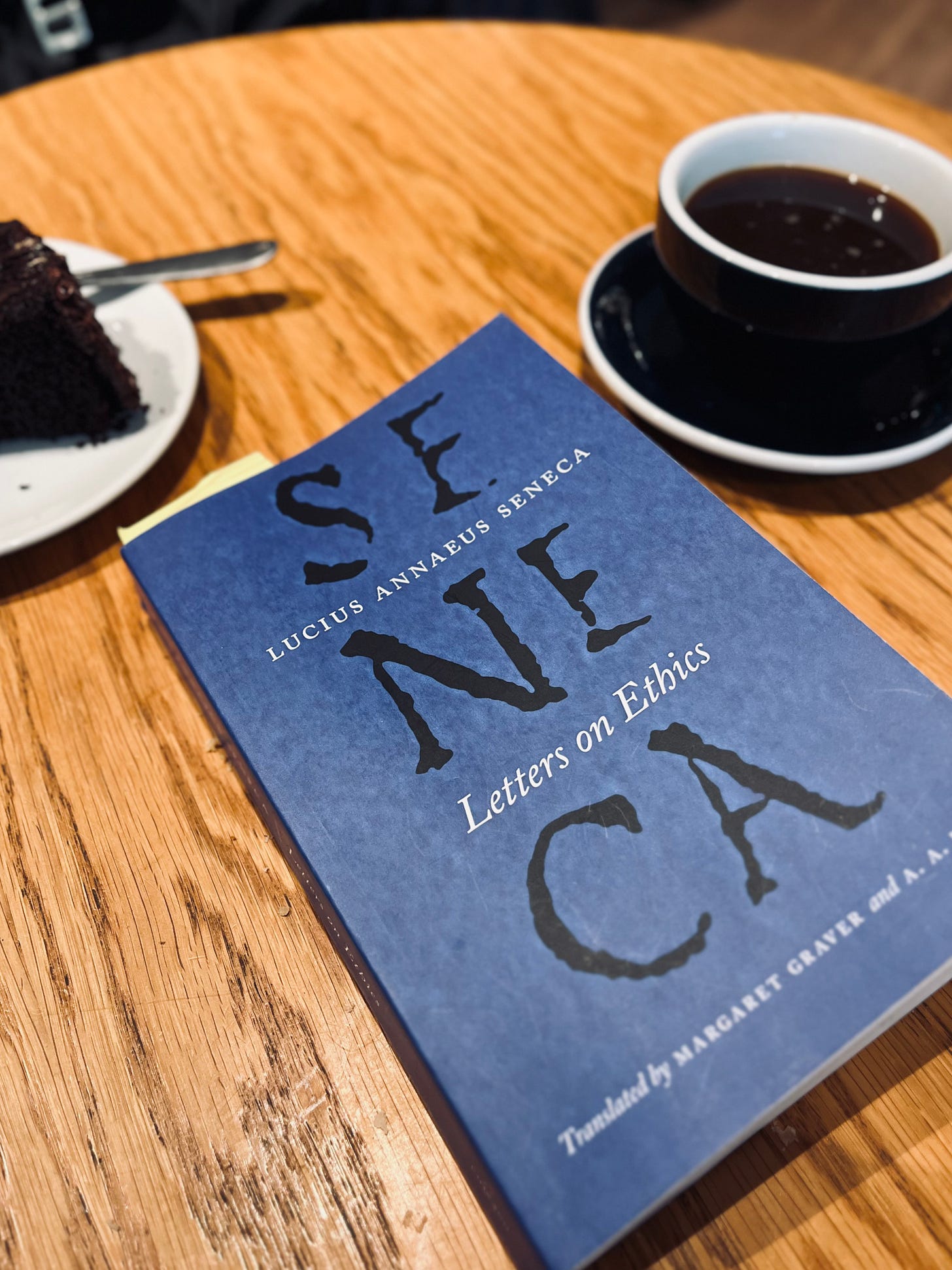Hello friends,
‘I have never seen such a vulgarian with such a fortune!’1 said Seneca when he described Calvisius Sabinus, a wealthy man who had ‘both the inheritance and the character of a freedman’. His inherited wealth however was not correlated with his inherited intelligence.
Sabinus wanted to appear educated among Rome’s elite but his memory was so poor that he could not remember anything he read. At one moment he would forget the name of Ulysses, at another the name of Achilles or Priam. Roman intellectuals were famed for their oratory skills, especially for quoting great poets to enhance their arguments in discussions. Sabinus however, was infamous among his friends for his primitive speech.
‘So he devised an expedient: he spent a great deal of money on slaves, one of whom was to know Homer by heart, another Hesiod, plus nine more, each assigned to one of the lyric poets.’
If only Sabinus knew that Seneca would make his stupidity immortal by writing about it in his letters. After assembling this staff around him Sabinus used to pester his dinner guests. ‘He had his slaves by his feet and yet even though he regularly asked for verses to quote, he often came to a halt in mid-sentence.’
We can laugh and mock Sabinus but with the invention of smartphones we have all become like him. Today we do not have to remember anything because we can forget nothing. Our slave is not a human being but the internet. Each time you cannot recall the name of a musician, an author or an actor you can search for it wherever you are.
Socrates: Invention that produces forgetfulness
A similar concern was raised by Socrates two millenia ago. Everything we know about Socrates comes from his student Plato who documented his teacher’s wisdom since Socrates refused to write anything down. In a dialogue called Phaedrus, Socrates says about writing:
"For this invention will produce forgetfulness in the minds of those who learn to use it, because they will not practice their memory.
Their trust in writing, produced by external characters which are no part of themselves, will discourage the use of their own memory within them.
You have invented an elixir not of memory, but of reminding; and you offer your pupils the appearance of wisdom, not true wisdom, for they will read many things without instruction and will therefore seem [275b] to know many things, when they are for the most part ignorant and hard to get along with, since they are not wise, but only appear wise."
Socrates’s argument does not suggest that Shakespeare should have memorised his plays by heart and recited them verbally instead of writing them down. This would have been a ridiculous notion of course.
What both Socrates and Seneca tell us is that knowledge needs to be digested, made our own, absorbed.
So it is with the food which nourishes our higher nature, – we should see to it that whatever we have absorbed should not be allowed to remain unchanged, or it will be no part of us. We must digest it; otherwise it will merely enter the memory and not the reasoning power.2
~ Seneca, Letter 84
Thus it would be silly to assume that Seneca’s intention is to humiliate Sabinus by bringing him up in his Letter. For Seneca, Sabinus is not a man of an inferior intelligence but a man of a languorous mind. To achieve mastery in the art of rhetoric one had to exercise their mind in the same way athletes exercise their body. Sabinus’s conscious refusal of honing a skill earned him a reputation of ‘a vulgarian with large fortune.’
Sapir-Whorf Hyphothesis
Allow me to share a conversation I had with a work colleague several years ago. My colleague and I were both bilingual and talked about teaching kids a second language. I was shocked to hear her saying that learning languages will be redundant soon, especially with the rise of Artificial Intelligence. Thus according to her: ‘What is the point of wasting their time if soon they can click a button and translate everything instantly?’
She left me speechless with this. There is a reason why Wittgenstein wrote ‘The limits of my language means the limits of my world.’ There are few things that shape us more than the language we speak. Every bilingual person knows how much their personality and their thinking changes when they switch from one language to another. One does not have to know about the existence of Sapir-Whorf hypothesis, which says that the structure of a language determines a native speaker's perception, to intuitively feel how much the language we speak shapes our worldview.3
My colleague unfortunately was suffering from what my reader and I can call by now -Sabinus’s syndrome. In this condition you do not want to rely on your natural faculties. You refuse to train your memory, to exercise your mind, to learn in general. It is this desire to outsource every hard mental effort onto tools - such as A.I. or paper - that worried Socrates, Seneca and today worries me.
Samuel Taylor Coleridge: The Curious Case of Cryptomnesia
There once lived a man who was at the opposite spectrum of Sibinus.
In his biography of Coleridge, Richard Holmes describes the poet’s prodigious memory. Coleridge was one of those geniuses who could remember almost everything he read. If Sabinus read and then could not recall anything, Coleridge read and could quote verbatim entire passages days, weeks, months and even years later. He absorbed every idea he read and made them his own. This however, came with a small problem.
Coleridge integrated each idea so deep into his psyche that he could no longer distinguish what idea was his own and what idea he borrowed from someone else.
In his wonderful collection of essays called The River of Consciousness, the neuroscientist Oliver Sacks suggests that Colerdige might have suffered from cryptomnesia, a condition where forgotten memories resurface as original thoughts. This could potentially explain why Coleridge’s Biographia Literaria is littered with ideas that clearly belong to the German philosopher Friedrich Schelling whom Coleridge read voraciously.
Coleridge’s cryptomnesia reminds me of American thinker Ralph Waldo Emerson who once said:
“I cannot remember the books I've read any more than the meals I have eaten; even so, they have made me.”
If our bodies consist of molecules and atoms, our minds consist of memories we collect. If we rely too much on our tools then we should not be surprised if our minds are shallow when those tools are taken away from us.
Sabinus’s mind was a blank slate without his slaves, but what about your mind and mine without internet? How many poems can we recite by heart? How many books do we know in detail? What proportion of our thoughts belong to us and what proportion to the opinion makers we listen to?
How much of us is left if we are stripped of our books, our notebooks and our devices?
Is it possible that to a degree we all suffer from Sabinus’s syndrome?
As always - Confide tibimet.
Proofread and edited by Lisa Statler
Do you want to keep a journal?
I’ve been journaling for the past 15 years of my life. By saying this I mean that for the past decade and a half, I’ve been sitting down, consistently, every day, and writing my thoughts and ideas into my notebook.
If you would like to begin your journaling journey, but don’t know where to start, how to stay consistent, or which type of journaling suits you, consider subscribing to my Patreon page.
I’ve made several ‘Guided journaling’ videos, where we sit down and journal together, I give journaling tips based on science, and I share some very personal pieces of advice based on my own journey.
Seneca, Letters, 27, University of Chicago Press
Seneca, Letters, 84, University of Chicago Press
More on this subject read Lera Boroditsky’s research on language and thinking. https://scholar.google.co.uk/citations?user=8mm3GBsAAAAJ&hl=en&oi=ao








I fully concur with both Socrates and you, Vashik. The reality is that many of humanity's inventions, originally intended for good, have been predominantly used for harmful purposes. AI, in particular, has begun to evoke fear, and it's true that people are relying less on their own intellect. The time is not far when human cognitive abilities will begin to decline.
The Word Exchange, by Alena Graedon, is a novel about this very idea; in it, people rely on a tech device to remember everything for them, so when those who control the device's content start eliminating words, the concepts represented by those words vanish, too.